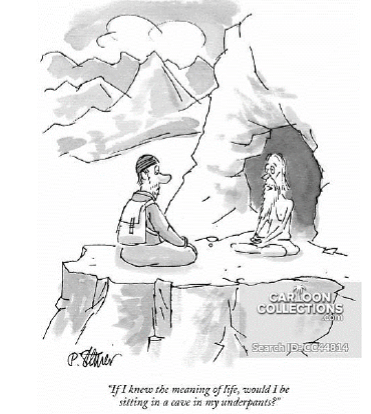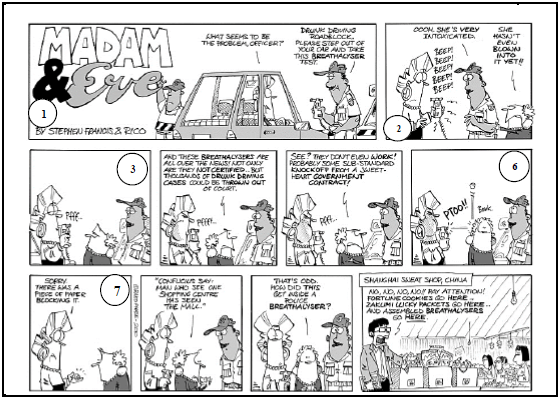English Home Language Paper 1 Questions - Grade 12 September 2021 Preparatory Exams
Share via Whatsapp Join our WhatsApp Group Join our Telegram GroupINSTRUCTIONS AND INFORMATION
- This question paper consists of THREE sections:
SECTION A: Comprehension (30)
SECTION B: Summary (10)
SECTION C: Language in context (30) - Read ALL the instructions carefully.
- Answer ALL the questions.
- Start EACH section on a NEW page.
- Rule off after each section.
- Number the answers correctly according to the numbering system used in this question paper.
- Leave a line after each answer.
- Pay special attention to spelling and sentence construction.
- Suggested time allocation:
SECTION A: 50 minutes
SECTION B: 30 minutes
SECTION C: 40 minutes - Write neatly and legibly.
QUESTIONS
SECTION A: COMPREHENSION
QUESTION 1: READING FOR MEANING AND UNDERSTANDING
Read TEXT A and TEXT B and answer the questions set.
TEXT A
WHY IT’S SO HARD TO FIND YOUR LIFE’S PURPOSE
by Douglas LaBier
- Over the decades I’ve heard many men and women – whether they’re psychotherapy patients working to build healthier lives or business executives trying to create healthier leadership – say that they don’t know why they’re really here, on this planet. Many turn to various books and programmes to identify their life’s purpose, but most come away dissatisfied, no closer than they were before.
- And yet, many do find and live-in harmony with their life’s purpose.
- Everyone feels a pull towards some defining purpose to his or her life, no matter how much it may have become shrouded along the way. In fact, all
forms of life have some purpose. There’s always movement or evolution towards some kind of outcome or fulfilment – whether it's a tree that produces fruit or clouds that form to produce rain. But we become so enraptured by our daily activity, engagements, goals that our awareness of our own unique life purpose is easily dimmed. - There are consequences to not finding your purpose. Often men and women who’ve become successful in their work or relationships – their outer lives – still feel hollow, unfulfilled. They describe feeling “off-track” in some way, or incomplete, despite a conventionally successful life. Sometimes they wonder if they’ve been on the “wrong” path all along –chosen the wrong career, or the wrong life partner.
- Or they haven’t realised that their chosen path could be more meaningful to them. If they let it.
- One thing is clear: The consequences of not finding your purpose include chronic, lingering dissatisfaction; an absence of inner peace and a sense of
not being fully in sync with your inner self. That's because your true inner self knows that your life purpose is out of sync with your outer life. The latter is often a false self, but you’ve identified with it because it’s been so rewarding to your ego. - Most people retain at least a glimmer of awareness of their life’s purpose within their inner being. It often feels like a leaning, an inclination, that continues to pull at you. Sometimes it is right in front of your eyes, but you don’t allow yourself to see it, like when you're hunting for your missing keys and then discover that they've been right in front of you the whole time. For example, an investment advisor found himself doing more and more work
with charity organisations. He finally realised that what he felt most in sync with was hands-on work helping people. That was the part he enjoyed about his work, not the money managing per se. Helping people was his true calling, and it was staring him in the face the whole time. - But it’s important not to confuse seeking happiness with finding your purpose. Happiness is what you experience in the daily flow of life – the highs and lows that are situational. They will fluctuate. But purpose is deeper. It’s more of an underlying sense of peace and fulfilment overall. It transcends everyday ups and downs, the disappointments or successes, even. They don’t distract you from that larger vision, your ideal, which is
like a magnet steadily pulling you towards it. - There are commonalities among those who find their true reason for being. They aren’t very preoccupied with self-interest. That sounds contradictory. But when you’re highly focused on yourself, with getting your goals or needs met – whether in your work or relationships – your purpose becomes
obscured. Letting go of self-interest opens the door to recognising your true self, so you can see whether it’s joined with your outer life and creates a sense of purpose – or clashes with it. Knowing who you are inside – your true values, secret desires, imagination; your capacity for love, empathy, generosity – all relate to and inform your life purpose. - Those who discover their life purpose also use their mental and creative energies to serve something larger than themselves. Giving your mental, emotional and creative energy comes naturally when you serve something other than your self-interest. For some, their service and sense of purpose is embodied in the work that they do every day. It’s the difference between passion in the service of creating a new product, rather than trying to capture a big market share from the product.
- Service towards something beyond ego is always visible in those who’ve found their purpose, whether younger or older. Sometimes it’s by conscious intent. For example, letting go of a previous path when they awaken to its not being in sync with their inner self.
- I find that men and women who set out to awaken to their life purpose radiate a calm inner strength, inspiration, power and success in whatever they do with their lives. It radiates to all around them.
[Adapted from: Google – huffpost.com]
AND
TEXT B
[Source: Cartoon Collections.com]
QUESTIONS: TEXT A
1.1 Refer to paragraph 1.
Account for the author’s reference to ‘decades’.(2)
1.2 List, in your own words, TWO types of people who seek to find their life’s purpose.(2)
1.3 Refer to paragraph 3.
‘Everyone feels a pull towards some defining purpose to his or her life, no matter how much it may have become shrouded along the way.’ (lines 8–10).
State, in your own words, the reason that many people consider their purpose to be obscure.(2)
1.4 Refer to paragraph 4.
Suggest a reason for the quotation marks used in “off-track” (line 17) and “wrong” (line 19).(1)
1.5 Refer to paragraph 6.
Using your own words, provide THREE possible consequences of not finding your life’s purpose. (3)
1.6 Refer to paragraph 7.
Is the following statement TRUE or FALSE? Quote to motivate your choice.Finding one’s purpose in life is always an obscure search for the unattainable. (1)
1.7 ‘If they let it.’ (line 22)
Discuss the effect of this short sentence in the context of the passage. (3)
1.8 ‘They aren’t very preoccupied with self-interest.’ (line 47)
Explain the apparent contradiction evident in this statement. (3)
1.9 The writer is of the opinion that sometimes one has to let ‘go of a previous path’ (line 64) to find one’s purpose.
Comment on the validity of this statement by referring to paragraphs 7 and 11. (3)
1.10 Refer to paragraph 8.
Explain why knowing one’s purpose ‘transcends everyday ups and downs’ (line 43) but experiencing happiness does not. (3)
QUESTIONS: TEXT B
1.11 There are two characters in this cartoon: a man with a backpack and a hermit.
Suggest a reason for the presence of the man with the backpack on the mountain top. (1)
1.12 The humour of this cartoon lies in the tone the hermit uses.
Discuss this statement. (2)
QUESTION: TEXTS A AND B
1.13 In your view, and taking paragraph 10 of TEXT A into consideration, how likely is the hermit to discover the meaning of life? Refer to TEXT A and
TEXT B in your answer. (4)
TOTAL SECTION A: 30
SECTION B: SUMMARY
QUESTION 2: SUMMARISING IN YOUR OWN WORDS.
You have been asked to research the value of perseverance. You found the following article (TEXT C) during your research on the internet. Summarise the contents of TEXT C IN YOUR OWN WORDS.
- Your summary should include SEVEN points and NOT exceed 90 words.
- Your summary must be in the form of a fluent paragraph.
- You are NOT required to include a title for the summary.
- Indicate your word count at the end of your summary.
TEXT C
PERSEVERANCE IS A MAJOR KEY TO A LIFE OF SUCCESS
Each of us thrives on being successful and in doing so we often forget the difficulties lying in the path to success. We set targets and want to achieve them right away, but we are humans and may not achieve those goals.
Failure at the start can lead to frustration, and it shatters the self-confidence you had at the beginning. You consider giving up on your dreams because you feel you can never succeed in life. The road to success is a slow and quite precarious journey at times. It takes hard work and time to build up and makes you solely responsible for your progress. However, perseverance will eventually lead you to your destination.
Perseverance is an essential element you need to achieve a high level of success. It doesn’t require any college education or training. It comes naturally. It doesn’t matter what your goal is or how long it takes you to reach that goal. The chances of your success depend largely on your willingness to persist and persevere.
Perseverance means to go on no matter what is in the way; to remain steadfast in accomplishing the difficult task. It requires a higher level of patience to develop perseverance. Someone who practises perseverance is more trustworthy than other people. People know you are not going to quit, no matter how hard the situation gets. You develop a sense of self-worth and confidence. You start taking ownership of the goals you have set to achieve. You become a firm believer that your destiny is in your hands. You control your own fate. Thus, it enhances the goal’s value for you and intensifies your motivation level. It leads you to wonderful findings and broadens your knowledge about yourself and your goals.
Perseverance. That’s the key to a successful life. If you keep persevering long enough, you will achieve your true potential. Just remember, you can do anything you set your mind to, but it takes action, persistence, and the courage to face your fears.
[Adapted from https://addicted2success.com/success-advice/perseverance-is-a-major-key-to-a-life- of-success/]
TOTAL SECTION B: 10
SECTION C: LANGUAGE STRUCTURES AND CONVENTIONS
QUESTION 3: ANALYSING ADVERTISING
Study the advertisements (TEXT D and TEXT E) below and answer the set questions.
TEXT D
[Source: www.Pinterest.ru]
The text in the advertisement reads as follows: PURRRRRRRRRRRRRRRRRRRRRRRR Excluding me you are the best in the world. CAT LOVE. GET MORE. WITH THE HIGHEST LEVEL OF PROTEIN. |
TEXT E
[Source: Kitty Blogger – Wordpress.com]
The text in the advertisement reads as follows: Whiskas proudly works with Battersea Dogs and Cats Home to re-home cats like Larry. Visit www.battersea.org.uk |
QUESTIONS: TEXT D
3.1 Account for the inclusion of the pack of cat food (at the bottom of the advertisement) as an advertising technique. (2)
3.2 ‘Cat love. Get more.’ Explain the double meaning implied by this slogan. (2)
QUESTION: TEXT E
3.3 ‘Good luck in your new home, Larry.’ In your opinion, is the inclusion of this sentence effective in conveying the advertiser’s message? (3)
QUESTION: TEXT D AND TEXT E
3.4 Discuss which advertisement would be more effective in reaching its target market. Refer to the text of the advertisement and to the visual in your answer. (3)
[10]
QUESTION 4: UNDERSTANDING OTHER ASPECTS OF THE MEDIA
Study TEXT F and answer the set questions.
TEXT F: CARTOON
[Source: Google]
QUESTIONS: TEXT F
4.1 ‘Oooh. She’s very intoxicated.’ (FRAME 2)
Discuss how the cartoonist conveys the officer’s tone in this sentence. Refer to his words and his body language. (3)
4.2 Suggest a reason for the change in Madam’s facial expression from FRAME 3 to FRAME 6. [Madam is the person blowing into the breathalyser.] (2)
4.3 Comment on the reason for the absence of dialogue in FRAME 6. (2)
4.4 Critically discuss the cartoonist’s use of satire to convey his message. (3)
[10]
QUESTION 5: USING LANGUAGE CORRECTLY
Read TEXT G, which contains some deliberate errors, and answer the set questions.
TEXT G
RIHANNA: LIFE, CAREER, NET WORTH AND MORE
- International pop star, Rihanna, drew attention on Tuesday after she had reacted to a news report about the ongoing farmers’ protest in India. She tweeted, “Why aren’t we talking about this? #FarmersProtest.” Her tweet was widely shared on social media. If you are wondering who Rihanna is, read on.
- After performing for music producers Evan Rogers and Carl Struken in 2003, her music career started at the age of 15. Her debut album Music of the Sun was realised by Def Jam in 2005. But it was in 2007 only that the singer gained recognition with her album, Good Girl Gone Bad. Her single, Umbrella, earned Rihanna her first Grammy Award.
- Over the years, the 32-year-old singer has won many accolades, including nine Grammy Awards, 13 American Music Awards, 12 Billboard Music Awards, and six Guinness World Records. She became the first female solo artist to sell out 10 concerts at London’s O2 Arena. Since debuting, 14 No 1 hits have featured on the Billboard Hot 100 chart. Rihanna featured in the Forbes’ list of richest self-made women in 2020.
- Apart from music, Rihanna also tried her hands at acting. She made her movie debut in 2012 with Battleship. She has also been involved in philanthropic work through her non-profit organisation Clara Lionel Foundation (CLF). The singer has a strong presense on social media with over 81 million Facebook fans, 101 million Twitter followers and 90.3 million Instagram followers.
- Rihanna is also an entrepreneur and co-own cosmetic brand, Fenty Beauty.
[Adapted from Indianexpress.com]
QUESTIONS: TEXT G
5.1 Account for the use of the apostrophe in line 2. (1)
5.2 After performing for music producers Evan Rogers and Carl Struken in 2003, her music career started at the age of 15. (lines 5–6) Rewrite this sentence, changing it into a complex sentence. (1)
5.3 Identify and correct the malapropism in paragraph 2. (1)
5.4 ‘But it was in 2007 only that the singer gained recognition with her album, Good Girl Gone Bad.’ (lines 7–8) Rewrite this sentence, putting the adverb in its correct place. (1)
5.5 ‘Over the years, the 32-year-old singer has won many accolades.’ Rewrite this sentence, changing it into the passive voice. (1)
5.6 Identify and correct the unrelated participle in paragraph 3. (1)
5.7 Refer to lines 13–15. Identify and correct the incorrect preposition. (1)
5.8 ‘non-profit’ (line 18) is an example of a compound …
- adverb.
- adjective.
- verb.
- noun. (1)
5.9 Identify and correct a spelling mistake in paragraph 4. (1)
5.10 Refer to lines 18–21. Identify and correct the error of concord. (1) [10]
TOTAL SECTION C: 30
GRAND TOTAL: 70